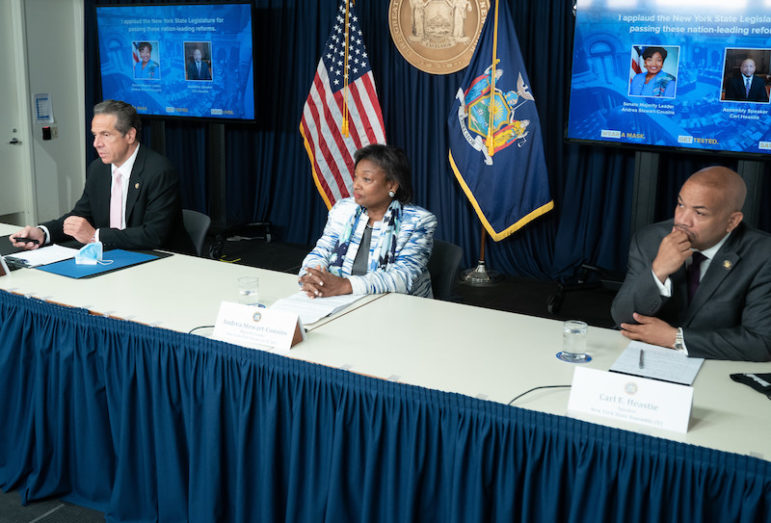A Cuomo executive order created a mechanism for people of parole to regain their right to vote, but advocates say it is unwieldy and impermanent.

Office of the Governor
Advocates are calling on Gov. Cuomo, Majority Leader Stewart-Cousins and Speaker Heastie to move legislation that has stalled for at least a decade and would restore voting rights once someone leaves prison.A coalition of criminal-justice reform and voting rights advocates is hoping 2021 is the year that New Yorkers on parole automatically get their right to vote restored.
State law bars people in prison or on parole from registering to vote or voting, a prohibition that advocates say raises basic issues of fairness, given the stark racial disparities in the criminal justice system. Seventy-two percent of the people in state prisons and 70 percent of those on parole in New York are Blacks or Latinos, who together comprise about 37 percent of the state population.
In 2018, Gov. Andrew Cuomo issued an executive order under which anyone released from prison to parole would be considered for a “conditional pardon” restoring their right to vote. More than 60,000 people have received those pardons.
Critics say, however, that the current system—which requires individual pardon decisions—needlessly delays the restoration of rights and also provides little information to people leaving prison about their pending re-enfranchisement.
“The current process results in a weeks-long delay between an individual’s release from prison and when they get their voting rights back, leaving room for confusion among election officials about who is eligible to vote,” read a letter advocates sent last Wednesday to the governor, Senate Majority Leader Andrea Stewart-Cousins and Assembly Speaker Carl Heastie. “It is also discretionary, can be easily rescinded by future governors, and is an inefficient use of government resources.”
The letter was signed by dozens of organizations, including the Brennan Center for Justice at NYU School of Law, Citizens Union, Common Cause New York, the Community Service Society of New York, League of Women Voters of New York State, New York Civil Liberties Union and VOCAL-NY.
The state prison system releases upwards of 20,000 people a year to parole, and some 36,000 people are currently under community supervision in the state. While some parole terms are brief, they can last as long as 10 years.
The state Assembly and Senate have considered legislation that would automatically restore voting rights upon release from prison. The most recent version of the measure would also require that courts inform defendants about the loss of voting rights that will result from a guilty plea. It would mandate that prisons and jails inform people who are about to be released about the restoration of rights, provide them with voter registration forms and submit completed forms to election officials.
In the Senate, similar bills have been introduced in the past six legislative sessions, but none has ever made it out of committee—even after the Democrats took control of the Senate in 2019, and the measure attracted 25 co-sponsors. Leroy Comrie, a Queens Democrat, sponsored the most recent Senate version; Manhattan Democrat Daniel O’Donnell was the Assembly sponsor.
“If the goal of imprisonment is truly to prevent individuals from straying from the confines of our laws and society’s norms, then facilitation of reentrance into the voting process should be an essential component of rehabilitation and reintegration during community supervision,” reads the legislative justification on the most recent version of the bill.
While the 2020 elections have come and gone, New York City residents who are released from prison in the coming months could participate in the 2021 municipal elections for mayor, other citywide offices, borough president, City Council and district attorney of Brooklyn and Manhattan. The following year, 2022, will see races for governor and other statewide offices, the state Assembly and Senate, Congress and one of New York’s two seats in the U.S. Senate.
New York is one of many states that bars voting even for people who have completed their prison terms. Two states (Maine and Vermont) do not strip people in prison of their voting rights, and 17 states automatically restore the franchise after release from prison.









